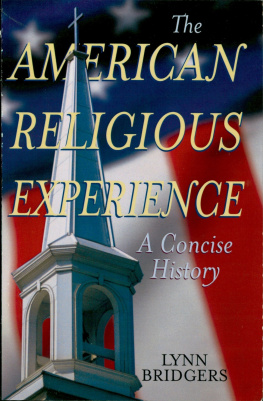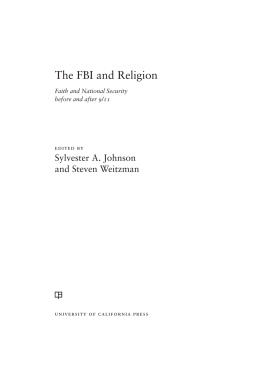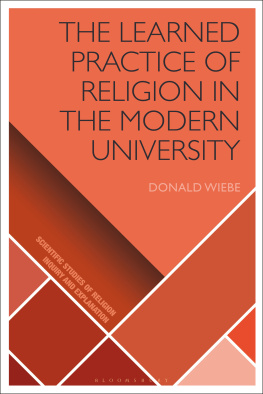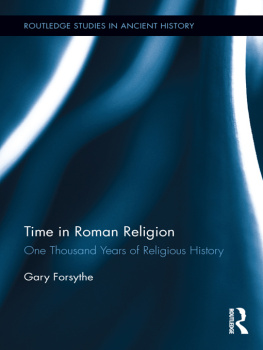First Illinois paperback, 2008
2002 by the Board of Trustees
of the University of Illinois
All rights reserved
Manufactured in the United States of America
1 2 3 4 5 C P 5 4 3 2 1

This book is printed on acid-free paper.
The Library of Congress cataloged the cloth edition of this
volume as follows:
Underwood, Doug.
From Yahweh to Yahoo!: the religious roots of the secular press /
Doug Underwood.
p. cm.(The history of communication)
Includes the bibliographical references (p.) and index.
ISBN 0-252-02706-x
1. Religion and the pressUnited StatesHistory.
I. Title. II. Series.
PN4888.R44U53 2002
070.9dc21 2001003514
Paperback ISBN 978-0-252-07571-1
For Susanne and Marika and AlidaPREFACE
A few years ago, my former editor at the Seattle Times, Mike Fancher, issued a directive to his newsroom subordinates: pick a church, go to church activities, interview church members, and find out what is going on out there among churches and the people who attend. However, writing in his Sunday column in the Times, Fancher said he hoped to dispel a rumor that the Times was requiring its journalists to become churchgoers. The exercise had nothing to do with the newspaper's concern about its employees spiritual lives, he explained. The purpose was to help the newspaper get a better handle on how churches in the community work, how they involve themselves in politics, and how to do a better job of covering the religious lives of readers.
As I read Fancher's column, I found myself struck by a number of ironies that might occur to anyone who has had a career in the daily newspaper business. American journalists can seem most awkward when they face news stories that take them far outside their professional culture and their normal frame of reference. Somehow I just could not keep from smiling at the odd prospect of a group of wary, reluctant journalists, notebooks in hand, fanning out around the community to attend church, like anthropologists heading off to visit the natives.
Beyond this image of journalists as modern-day Margaret Meads and the churches as some sort of primitive culture to be studied and probed, I found myself asking the broader, philosophical questions that come up whenever critics examine the press's attitude toward religion. How can organizations devoted to clear-eyed pragmatism and hard-nosed fact gathering cover the ineffable, the unknowable, essentially the collective life of the soul of their audience? How can a news business whose professional values grew out of the Enlightenment ideas of Voltaire and Thomas Paine, with their rational skepticism and their undisguised hatred of religious dogma and Christian orthodoxy, report in a balanced fashion on a religious community that in many quarters still harbors the most traditional of religious beliefs? Besides, who is to say that the Times journalists weren't already going to church on their own? What does it say about the culture of the newsroom when editors simply assume their journalists have no contact with church-going people?
I also found myself wondering if this newfound interest in religion among the Times management sprang from the agenda that has become the hallmark of modern-day, market-oriented journalismhow to stay in better touch with readers. Religion has seen an upsurge of interest among Americans, particularly aging baby boomers, and U.S. media organizations everywhere have been wrestling with how to better cover an issue that has long been relegated to the Saturday religion page.
I have written extensively about the impact of market-driven or readerdriven journalism on today's media organizations and the new generation of newsroom managers who let audience research guide their news judgment. Religion plays a powerful role in the lives of Americans and to a much greater extent than the news media generally recognize, but I also found myself asking: is it possible that all this hoopla over religion coverageby the Times and other media organizationsamounts to little more than a marketing ploy? If that is so, how can religion reporting become better if the motives are thoroughly commercial at the core and, at some fundamental level, at odds with the true meaning of religion?
At this point, I must acknowledge that, in the nearly fifteen years since I left the daily newspaper business, the subject of religion has come to hold more than passing interest for me. When I read Fancher's column, I was set to embark on an unlikely odyssey for a veteran of the daily newspaper reporting business: a year of study at a Quaker seminary, the Earlham School of Religion in Richmond, Indiana, where I hoped to learn more about the faith in which I had been raised but with which I had lost touch during long stretches of my adult life. My growing interest in religion coincided with my exit from journalism and my entry into the academic worldand I suspect that the two events were not unrelated. In one respect, I was happy to leave a business that I felt had lost sight of its public service obligations amid the push for higher profits and the fixation on marketing strategies to gain readers. But since I left the Times, I had come to realize that my differences with the new breed of media managers were about something more than just professional philosophy. For me, journalism had been a higher callinga place for me to speak truth to power, as the well-known Quaker maxim puts itand I now recognized that my disillusionment with the profession was tied to my perception that major elements of the media business were no longer maintaining the faith.
While I spent much of that sabbatical year at the Earlham School of Religion exploring personal issues, I also had time to reflect on what it meant to my former colleagues to be left behind in a profession where the idealism that attracted many of them to journalism was being undermined by severe economic, technological, and sociodemographic pressures. Journalism, as so many of my old newsroom friends were discovering, is now viewed at many news organizations as just another commodity in the world of commerce. Although journalists would likely be loath to put it this way, I found myself wondering if there was not a crisis of faith, as I have come to see it, in the newsrooms where my former colleagues still toiled away.
As I reflected on the meaning of the journalistic mission in spiritual terms, I found myself ruminating about other ironies, too. Journalists in the United States have long been highly attuned to the moral void at the core of our commercialized culture, but, sadly, this often manifests itself in cynical, negative, self-righteous ways. Mainstream reporters and columnists rail in high moral pitch against the corruption of special interest money in politics, the hypocrisies of high officialdom, the lack of personal morality of public figures, the inequities inherent in astronomical salaries in business and sports, and the damaging effects of the consumer culture on youth. But the American public seems thoroughly unimpressed by journalists who hold themselves up as the moral guardians of the age.





![Blackford - Freedom of religion [and] the secular state](/uploads/posts/book/167779/thumbs/blackford-freedom-of-religion-and-the-secular.jpg)



 This book is printed on acid-free paper.
This book is printed on acid-free paper.